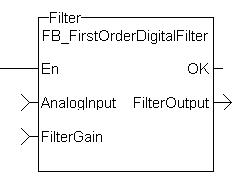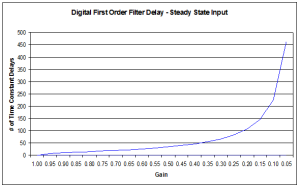FB_FirstOrderDigitalFilter
 Function Block
Function Block![]() A function block groups an algorithm and a set of private data. It has inputs and outputs. - Defined to filter an Analog signal.
A function block groups an algorithm and a set of private data. It has inputs and outputs. - Defined to filter an Analog signal.
Inputs
|
Input |
Data Type |
Range |
Unit |
Default |
Description |
|---|---|---|---|---|---|
|
EN |
BOOL |
No range |
N/A |
No default |
Enables execution. Used in the FFLD |
|
AnalogInput |
INT |
No range |
N/A |
No default |
Analog Input from transducer. |
|
FilterGain |
REAL |
1 - 0.05 |
N/A |
No default |
Filter gain. |
Outputs
|
Output |
Data Type |
Range |
Unit |
Description |
|---|---|---|---|---|
|
OK |
BOOL |
0, 1 |
N/A |
Execution successful. |
|
FilterOutput |
REAL |
0, 1 |
N/A |
Filtered analog input value. |
Remarks
In any control system with an analog feedback signal present, there is the risk of unwanted noise and jitter that can compromise the signal integrity yielding a less the desirable system.
- This Kollmorgen UDFB
 "User Defined Function Block"
UDFB can be used as a sub-function block in another program of the application. It is described using FBD, LD, ST or IL language. Input / output parameters of a UDFB (as well as private variables) are declared in the variable editor as local variables of the UDFB provides a digital first order filter of an analog feedback signal from an LVDT, tension transducer, potentiometer, encoder, resolver, or some other like device.
"User Defined Function Block"
UDFB can be used as a sub-function block in another program of the application. It is described using FBD, LD, ST or IL language. Input / output parameters of a UDFB (as well as private variables) are declared in the variable editor as local variables of the UDFB provides a digital first order filter of an analog feedback signal from an LVDT, tension transducer, potentiometer, encoder, resolver, or some other like device. - The amount of filtering is based on a gain value and can provide no filter to full filter conditioning.
This image shows the function or function block I/O.
Figure 6-107: CBS First Order Digital Filter
Usage
When using this UDFB, the Enable (EN) input should always be energized to provide the desired filtering.
- The AnalogInput input is the unfiltered analog feedback signal from an LVDT, tension transducer, potentiometer, or some other like device.
- The FilterGain defines the amount of filtering to be used.
- The range of the gain is from 1.0 or no filtering to 0.05 or the maximum filtering.
- The FilterOutput is the filtered analog input.
- It is used as an input to some other function block or UDFB that has an analog input (e.g., the MCFB_GearedWebTension UDFB).
- The implementation of the digital first order filter is for PLCopen
 A vendor -and product- independent worldwide association active in Industrial Control and aiming at standardizing PLC file formats based on XML.
A vendor -and product- independent worldwide association active in Industrial Control and aiming at standardizing PLC file formats based on XML. - The equation is defined as:
Input*Gain+Output*(1-Gain) = Output. - The steady state filter delay with a gain of 0.8 is shown in the Filter Input Delay table.
Filter Input Delay
|
FilterGain |
FilterInput |
FilterOutput |
|---|---|---|
|
0.8 |
0 |
0 |
|
|
100 |
80 |
|
|
100 |
96 |
|
|
100 |
99.2 |
|
|
100 |
99.84 |
|
|
100 |
99.968 |
|
|
100 |
99.9936 |
|
|
100 |
99.99872 |
|
|
100 |
99.999744 |
|
|
100 |
99.9999488 |
|
|
100 |
99.99998976 |
|
|
100 |
99.99999795 |
|
|
100 |
99.99999959 |
|
|
100 |
99.99999992 |
|
|
100 |
99.99999998 |
|
|
100 |
100 |
|
|
100 |
100 |
|
|
100 |
100 |
|
|
100 |
100 |
|
|
100 |
100 |
|
|
100 |
100 |
|
|
100 |
100 |
|
|
100 |
100 |
Filter Delay Tn
In this table:
- The numbers of filter delays for a steady state analog input at a given gain are listed.
- The range of the filter gain is between 1.00 and 0.05.
- For a filter gain of 0.8 there is a delay of 15 time constants with a time constant defined as the rate the UDFB is scanned or executed in the application.
- Example: If the UDFB was executed every millisecond a gain of 0.8 would provide a filter delay of 15ms.
- Conversely a gain of 1.00 provides zero filtering and the output signal follows the input signal, and a gain of 0.05 provides the most filtering for 463 ms.
Example: Filter Input Lag - Random Input
A real world analog input is most always a varying feedback signal.
In this table, an initial input of 100, a gain of 0.8, and a random variability of 10%.Filter Input
|
Filter Input |
Filter Current Output |
Amount of Input Filtering |
Random Filter % Variation |
|---|---|---|---|
|
0 |
0 |
0 |
10% |
|
100 |
80 |
-20 |
|
|
97.38903813 |
93.9112305 |
-3.477807626 |
|
|
92.67638093 |
92.92335084 |
0.246969915 |
|
|
94.12988912 |
93.88858146 |
-0.241307655 |
|
|
103.0835564 |
101.2445614 |
-1.838994993 |
|
|
91.16845433 |
93.18367575 |
2.015221422 |
|
|
93.23936976 |
93.22823096 |
-0.011138803 |
|
|
94.90272089 |
94.56782291 |
-0.334897986 |
|
|
103.3070737 |
101.5592235 |
-1.747850153 |
|
|
96.83149418 |
97.77704005 |
0.945545867 |
|
|
96.35024002 |
96.63560002 |
0.285360007 |
|
|
99.82417525 |
99.1864602 |
-0.637715045 |
|
|
105.0792636 |
103.9007029 |
-1.178560685 |
|
|
97.36988208 |
98.67604626 |
1.306164172 |
|
|
107.82502 |
105.9952253 |
-1.829794752 |
|
|
97.7886524 |
99.42996698 |
1.641314572 |
|
|
108.2038024 |
106.4490353 |
-1.754767081 |
|
|
91.58527607 |
94.55802792 |
2.972751845 |
|
|
93.6783421 |
93.85427926 |
0.175937164 |
|
|
102.8695349 |
101.0664838 |
-1.803051129 |
|
|
93.95916817 |
95.3806313 |
1.421463121 |
|
|
108.6579707 |
106.0025028 |
-2.655467871 |
|
|
109.3425748 |
108.6745604 |
-0.668014397 |
|
|
103.9066 |
104.8601921 |
0.953592077 |
|
|
92.30112142 |
94.81293555 |
2.511814127 |
|
|
109.4460726 |
106.5194452 |
-2.926627416 |
|
|
94.88799896 |
97.21428821 |
2.326289251 |
|
|
105.4738635 |
103.8219484 |
-1.651915057 |
|
|
102.988167 |
103.1549233 |
0.166756284 |
|
|
92.92925408 |
94.97438792 |
2.045133846 |
|
|
95.58185568 |
95.46036213 |
-0.121493552 |
|
|
109.414248 |
106.6234708 |
-2.790777178 |
|
|
106.5661311 |
106.577599 |
0.011467953 |
|
|
99.85857253 |
101.2023778 |
1.343805301 |
|
|
107.865421 |
106.5328124 |
-1.332608643 |
|
|
92.19683177 |
95.0640279 |
2.867196126 |
|
|
104.8558146 |
102.8974573 |
-1.958357346 |
|
|
104.5140236 |
104.1907104 |
-0.323313268 |
|
|
104.3675014 |
104.3321432 |
-0.035358206 |
|
|
109.2704266 |
108.2827699 |
-0.987656683 |
|
|
101.4962729 |
102.8535723 |
1.35729941 |
|
|
92.19199163 |
94.32430776 |
2.132316128 |
|
|
99.13065312 |
98.16938405 |
-0.961269073 |
|
|
103.5068114 |
102.4393259 |
-1.067485466 |
|
|
109.502983 |
108.0902516 |
-1.412731426 |
|
|
99.05504822 |
100.8620889 |
1.80704068 |
|
|
94.97711299 |
96.15410817 |
1.176995182 |
|
|
107.1063597 |
104.9159094 |
-2.190450308 |
|
|
91.12245188 |
93.88114339 |
2.758691504 |
|
|
108.130314 |
105.2804799 |
-2.849834129 |
|
|
104.2923832 |
104.4900025 |
0.197619344 |
|
|
101.3775072 |
102.0000062 |
0.62249907 |
|
|
100.5303014 |
100.0399168 |
-0.490384645 |
Averages |
FBD Language Example
FFLD Language Example
IL Language Example
Not available.
ST Language Example
//Filter analog input signal with a gain of 0.8 to remove noise
FilteredOutput:= Inst_FB_FirstOrderDigitalFilter( AnalogInput1Value, 0.8 );










